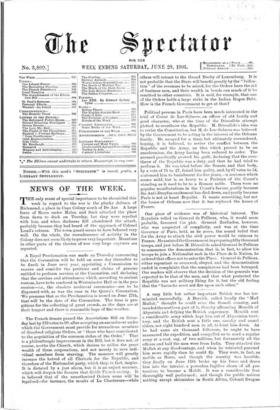Political persons in Paris have been much interested in the
trial of Count de Lur-Saluces, an officer of old family and good character, who at the time of the Deroulede attemPt plotted to overthrow the Republic. M. Deroulede's idea was to revise the Constitution, but M. de Lur-Saluces was believed by the Government to be acting in the interest of the Orleans family. He escaped for a time, but ultimately surrendered, hoping, it is believed, to revive the conflict between the Republic and the Army, an idea which proved to be an anachronism, the Army having been reduced to order. The accused practically avowed his guilt, declaring that the over- throw of the Republic was a duty, and that he had tried to perform it. He was tried before the Senate, and that body, by a vote of 71 to 27, found him guilty, and, by 67 votes to 54, sentenced him to banishment for five years,—a sentence which seems mild, but is as heavy to a Parisian of the Count's standing as it used to be to a Roman noble. There were no popular manifestations in the Count's favour, partly because the Anti-Dreyfus excitement has died down, and partly because Paris is not at heart Royalist. It wants something, but not the house of Orleans now that it has replaced the house of France.




















































